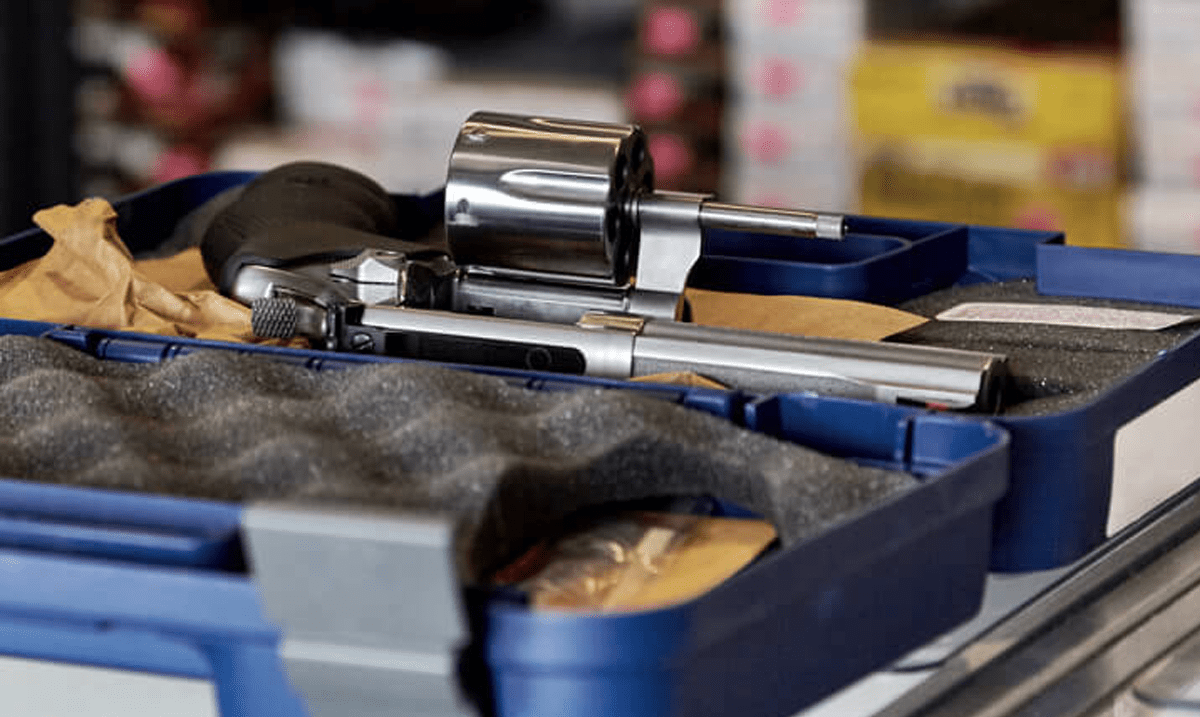 Back to News
Back to News
June 12, 2025
Mexico Lost Big at SCOTUS, Pressing Ahead with Retailer Lawsuit
Mexico’s President Claudia Sheinbaum isn’t done with her country’s abuse of the U.S. judicial system. After taking a loss at the U.S. Supreme Court with her country’s $10 billion lawsuit against U.S. firearm manufacturers, she’s still planning to go ahead with a similar lawsuit that is pending in federal court against five Arizona federally licensed firearm retailers.
The U.S. Supreme Court shot down Mexico’s claim that U.S. firearm manufacturers are responsible for $10 billion in damages resulting from the illegal firearm trafficking by narco-terrorist drug cartels. The case, Smith & Wesson Brands, Inc., et al. v. Estados Unidos Mexicanos, resulted in a unanimous 9-0 decision in which Justice Elana Kagan wrote in the Court’s opinion that the Protection of Lawful Commerce in Arms Act (PLCAA) bars the lawsuit.
President Sheinbaum thinks Mexico has another bite at the apple, though.
Target: Arizona Retailers
“There is another pending lawsuit,” President Sheinbaum said at a news conference, as reported by Breitbart. “This one was against gun manufacturers. There is another lawsuit that is against gun distributors and gun stores. That is the one that we will be working with our legal team to move forward.”
That case she’s referring to is Estados Unidos Mexicanos v. Diamondback Shooting Sports, Inc. Ironically, Mexico alleges the strikingly similar theories of liability in this lawsuit against five firearm retailers that were raised – and rejected – in the lawsuit against U.S. firearm manufacturers. Mexico alleges in their complaint that the firearm retailers, “systematically participate in trafficking military-style weapons and ammunition to drug cartels in Mexico by supplying gun traffickers.” It further argues that the firearm retailers “know or should know that their reckless and unlawful business practices – including straw sales, and bulk and repeat sales of military-style weapons – supply dangerous criminals in Mexico and the U.S.”
Defendants moved to dismiss the case in February 2024, arguing Mexico lacked standing and that the PLCAA barred the case.
Mexico’s lawyers, however, rejected the argument the PLCAA bars their claims against the firearm retailers arguing the stores have the “opportunity and obligation” to stop the sales of firearms likely to be illegally trafficked to Mexico. Obama-appointed U.S. District Court Judge Rosemary Marquez allowed the case to move forward, although she granted dismissal of claims the stores violated Arizona’s Consumer Fraud Act and the federal Racketeer Influenced and Corrupt Organizations (RICO) Act, as well as a public nuisance claim.
The Tucson Sentinel reported in March 2024, “She rejected the claim that PLCAA protects the stores from the suit, and ruled that arguments the five stores are negligent could move forward. In her ruling, Marquez wrote she was ‘unconvinced’ by arguments the 2nd Amendment and state law ‘negate recognizing a duty of care here.’” Respectfully, the court is wrong. Congress, in enacting the PLCAA, preempted generalized negligence claims only allowing claims that fit within the law’s narrowly drafted exceptions.
Amorphous Theory of Liability Nixed
The Supreme Court rejected Mexico’s claims against U.S. gun manufacturers that they “aided and abetted” the illegal firearms smuggling. The Court determined that Mexico’s sweeping, generalized claims did not meet the standard for aiding and abetting liability, as the complaint did not plausibly allege that the manufacturers participated in the cartels’ alleged crimes or took actions to make them succeed. Likewise, the Court reaffirmed that aiding and abetting liability does not attach based on an allegation that a company merely knew that “some bad actors” are taking advantage of its product for criminal purposes. Thus, the Court rejected Mexico’s generalized theory that manufacturers should do more to regulate retailers’ practices to reduce the possibility of misconduct and that manufacturers were liable due to “marketing and design choices” that made their products attractive to cartel members.
In the Arizona lawsuit, Judge Marquez previously rejected the retailer defendants’ argument that the PLCAA bars Mexico’s similarly amorphous claim that the retailers “systematically violated” a litany of legal obligations relating to “straw sales” without alleging that they violated any specific laws. Rather, the court (incorrectly) accepted the narrative that Mexico weaved together, describing a web of “red flags” indicating that the retailers knew or should have known that the firearms they sold would ultimately end up in criminal hands in Mexico. And one of these “red flags” cited by the court was the “repeat sales of military-style weapons favored by Mexican cartels.”
There are problems with Mexico’s theory of liability for retailers, though. For one, all firearms sold at retail are done with a completed Bureau of Alcohol, Tobacco, Firearms and Explosives (ATF) Form 4473. That’s the form that the buyer attests that they are not a person prohibited from buying a firearm and that they are the true intended recipient. And every sale by a dealer is preceded by a federally mandated background check to verify that the buyer is permitted to acquire the firearm. Also, as the lawyer for the five retailers noted, all multiple sales of handguns and modern sporting rifles along the Southwest border are required to be reported to the ATF and local law enforcement.
Mexico isn’t alleging that these processes weren’t followed. They are simply noting that firearms that were sold by these firearm retailers were recovered at Mexican crime scenes. There is no allegation that the firearms weren’t sold without the required Form 4473 background checks or multiple sale reporting. The allegation is that they somehow should have known that the firearms would eventually end up in Mexico and used criminally by cartel members. And Mexico’s complaint does not identify the specific firearms they allege were unlawfully sold by these retailers and later recovered at Mexican crime scenes.
What is more, Mexico’s amorphous, free-wheeling theory of liability is seriously in question considering the Supreme Court’s decision in Smith & Wesson. As was true in that case, Mexico’s allegations in the Arizona lawsuit likewise constitute a generalized complaint about how firearms are sold in the United States. In Smith & Wesson, the Supreme Court rejected the argument that manufacturers needed to “implement processes for monitor[ing] or supervis[ing] their [retailers’] sales practices, so as to minimize illegal sales to traffickers.” The Court said that the problem with this aiding-and-abetting theory of liability was not that Mexico had not pleaded with sufficient plausibility that manufacturers had the capability to figure out who the rogue retailers in their supply chain are, but rather that the PLCAA prohibits efforts to hold manufacturers of lawful firearms liable just for failing to make unaffiliated retailers “follow the law.” The same is true here. Retailers are not accomplices to the cartels’ crimes simply because they failed to stop individuals from lying on Form 4473.
Similarly, the Supreme Court rejected Mexico’s argument that manufacturers can be held liable under an aiding and abetting theory for “design and marketing decisions” that could “stimulate cartel members’ demand for their products.” The Supreme Court squarely rebuffed that theory, explaining that because “those products are both widely legal and bought by many ordinary consumers,” “manufacturers cannot be charged with assisting in criminal acts just because Mexican cartel members like those guns too.” It strains credulity to think that the same argument regarding the popularity of certain firearms could serve as a “red flag” for retailers to know or have reason to know that those products are likely to be smuggled into Mexico, let alone to use that fact to impose potentially crushing liability on industry members.
Retailers ‘Front Line’
The problem with Mexico’s theory is that illegal straw purchases of firearms is a crime committed by an individual lying on the ATF’s Form 4473. That’s punishable by up to 15 years in prison and a $250,000 fine. NSSF has a partnership program with ATF called “Don’t Lie for the Other GuyTM” that helps ATF to train retailers on how to be better able to spot and prevent illegal straw purchases and warn the public of the serious consequences of committing this crime. That partnership has been in place for over 25 years and NSSF hosted a month-long public awareness campaign in Arizona just last year. In fact, ATF and NSSF have brought the Don’t Lie campaign to Phoenix and Tucson several times over the years. ATF has long held – and recently reaffirmed – the firearm retailers are the front line of defense when it comes to preventing the illegal sale of firearms.
Peter Forcelli, former ATF executive who was also one of the Fast and Furious whistleblowers and authored a book of the experience titled The Deadly Path, called for reforms to partner more closely with firearm retailers. He said firearm retailers – and the industry at large – are “indispensable partners” in the fight against crime.
“Dealers are often the first line of defense to help identify suspicious purchases and flag possible trafficking organizations,” Forcelli wrote in an opinion column. “A partnership approach with the firearms industry is a vital component in keeping guns away from the wrong people, and it’s time for them to take that approach more seriously.”
The issue of illegal firearm trafficking and criminal misuse of firearms is one of critical importance to the firearm industry. NSSF is sympathetic to the plight of Mexicans who suffer at the hands of violent and ruthless narco-terrorist drug cartels. The fact remains, though, that Mexico is responsible for enforcing the laws on their side of the border.
Mexican Showdown
There are things that Mexico can – and should – do to prevent narco-terrorists from smuggling guns illegally into their country. First and foremost, Mexico needs to root out corruption in their own government. There is example after example of the highest ranks of Mexico’s government being tied closely with narco-terrorist drug cartels. Mexico’s then-President Andrés Manuel López Obrador is credibly accused of taking bribes from narco-terrorist drug cartels for his own election and then used a soft approach toward the cartels. Mexican government corruption was embodied through President Obrador’s “hugs, not bullets” campaign. That effort was labelled a failure by the Council on Foreign Relations.
Mexico’s current president, President Sheinbaum, is President Obrador’s hand-picked successor. Until Mexico’s government takes its own systemic corruption seriously, there is little hope for Mexican citizens.
Mexico can also realize that the U.S. judicial system is not their playground to pursue wholesale changes to the U.S. Constitution. In May, President Sheinbaum rebuked the idea of U.S. troops assisting with hunting down and holding narco-terrorists accountable for concerns of Mexico’s sovereignty. President Sheinbaum wasn’t concerned about U.S. sovereignty, however, when her lawyers argued their case before the U.S. Supreme Court and she’s not concerned about it with her country’s lawsuit against Arizona firearm retailers.
That point can be driven home by the U.S. State Department urging Mexico to stop attacking the Second Amendment freedoms of law-abiding citizens. The United States, through President Donald Trump, has offered assistance to stop the cartels that plague Mexico’s citizens. The problem has been identified. Mexico needs to stop scapegoating their own unwillingness to protect its own citizens.
You may also be interested in:
Categories: BP Item, Featured, Government Relations, Top Stories









